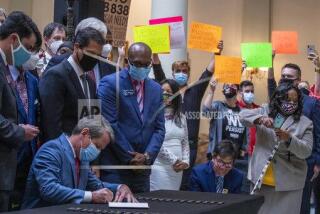Apartheid Act Casts Doubt on Local Laws
Amid the furor of debate surrounding the enactment of federal sanctions against South Africa, at least one critical issue has escaped resolution: whether the Anti-Apartheid Act precludes the enforcement of state and local anti-apartheid laws.
This issue affects the responsibilities of numerous local government officials, the business of hundreds of U.S. companies and the lives of thousands of South Africans. Although the courts have not yet addressed this question, it is probable that the federal act preempts state and local laws.
The act presents two possible grounds for preemption of state and local anti-apartheid measures. First, it appears to occupy the field of anti-apartheid law. More than 100 cities and states adopted anti-apartheid measures before the enactment of the federal statute. Many of these state laws and local ordinances impose stronger sanctions against South Africa, and U.S. companies with business ties to South Africa, than does the federal law. Massachusetts, for example, requires the divestiture of all public pension funds from companies operating in South Africa. Los Angeles has adopted a similar ordinance, and also prohibits contracts for goods or services involving city funds with companies that own property in South Africa or that have done business recently with the South African government. The all-encompassing nature of the federal act indicates congressional intent to invalidate such state and local regulations.
The act says that its purpose is to “set forth a comprehensive and complete framework to guide the efforts of the United States in helping to bring an end to apartheid.” This declaration implies that the act is intended to preempt local regulations in order to offer a national response to apartheid. The Senate record supports such an interpretation. Sen. Richard G. Lugar (R-Ind.), one of the act’s sponsors, said that it was intended to “occup(y) the field with regard to U.S. law on apartheid.” An amendment offered by Sen. Alfonse M. D’Amato (R-N.Y.) would have reversed this and permitted state and local anti-apartheid laws and ordinances to remain in force. That amendment was defeated. The House passed a resolution saying that the bill would not preempt state and local regulations. The resolution, however, is not part of the act, and is not law.
A second basis for preemption of state and local regulations is that such measures interfere with the federal government’s power to conduct foreign relations. The U.S. Supreme Court has found actions by states and municipalities that intrude on the federal foreign-relations power to be unconstitutional regardless of whether such actions actually conflict with federal statutes. Accordingly, local anti-apartheid laws governing international relations with South Africa might be unconstitutional even if they do not conflict with the Anti-Apartheid Act.
The act applauds the commitment of U.S. firms in South Africa that adhere to the Sullivan Principles. It also requires U.S. firms in South Africa to implement fair labor standards to improve the status and future of their employees in that country.
State and local sanctions, by prohibiting procurement from U.S. firms doing business in South Africa and by prohibiting the investment of public pension funds in such firms, penalize U.S. businesses for remaining in South Africa and in effect coerce them into leaving. Such coercion arguably stands as an obstacle to the accomplishment of objectives expressed in the act as to the presence of U.S. firms in South Africa and, in so doing, interferes with the federal foreign-relations power. Federal disapproval of certain state and local actions is indicated by a provision in the act enabling the federal government to withhold funds from states and localities that tie projects using federal money to compliance with non-federal anti-apartheid regulations.
The continuing validity of state and local anti-apartheid regulations thus is called into serious question by the federal act. Whether the act is actually preemptive is a question now left to the courts. Individuals and groups displeased with the uncertainty surrounding this issue have only one option outside the courtroom: to contact their members of Congress and lobby for the enactment of an amendment to the federal act specifically addressing the issue of whether it precludes the enforcement of local regulations.
More to Read
Get the L.A. Times Politics newsletter
Deeply reported insights into legislation, politics and policy from Sacramento, Washington and beyond. In your inbox three times per week.
You may occasionally receive promotional content from the Los Angeles Times.










